Informatics & Media: Smartphone Policy, Ethics, and Healthcare Impact
VerifiedAdded on 2023/04/23
|7
|2081
|95
Essay
AI Summary
This essay examines the significant role of technology, particularly smartphones and social media, in modern healthcare, focusing on the need for a comprehensive hospital policy to manage their usage. It discusses the ethical and legal liabilities for hospitals and employees, emphasizing patient privacy and data breach prevention. The essay also addresses third-party access rights to social media posts, differentiating between public and private content, and explores the relationship between accreditation decisions, reimbursement, quality of care, and informatics. Ultimately, it advocates for balanced policies that leverage technology's benefits while mitigating potential disruptions and ethical concerns within healthcare settings. Desklib provides access to this document along with a wealth of study resources, including past papers and solved assignments, to support students' academic endeavors.
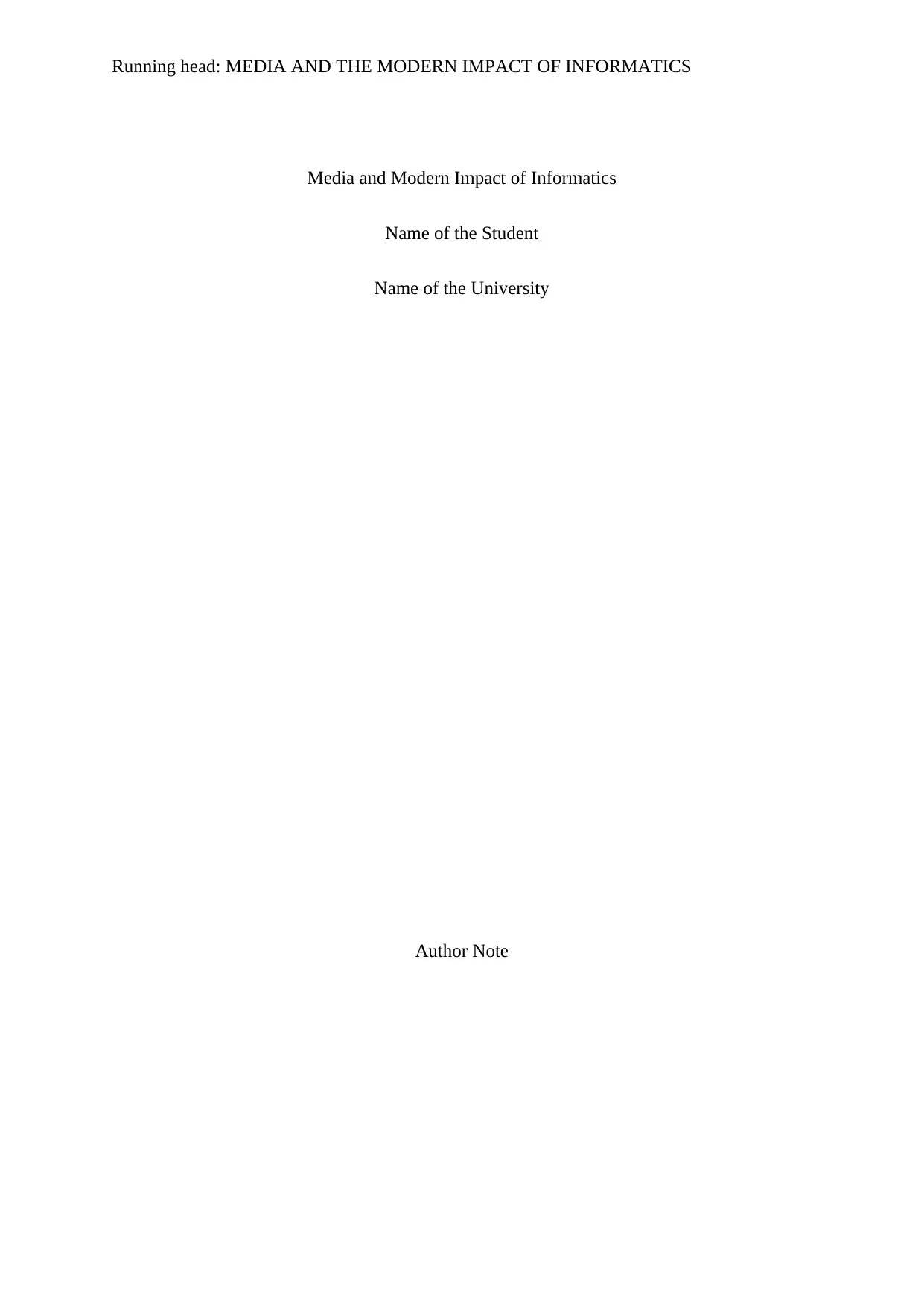
Running head: MEDIA AND THE MODERN IMPACT OF INFORMATICS
Media and Modern Impact of Informatics
Name of the Student
Name of the University
Author Note
Media and Modern Impact of Informatics
Name of the Student
Name of the University
Author Note
Paraphrase This Document
Need a fresh take? Get an instant paraphrase of this document with our AI Paraphraser
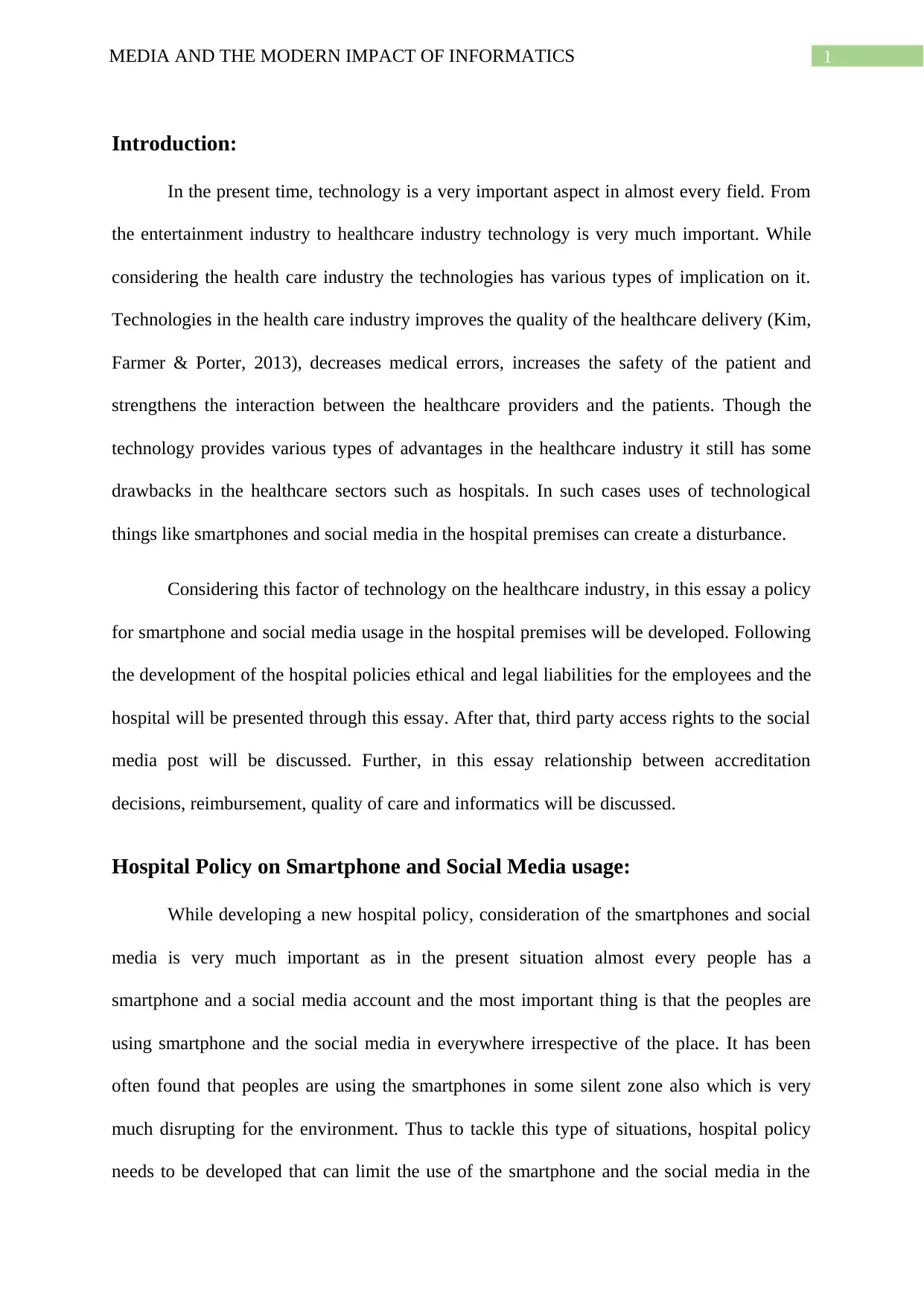
1MEDIA AND THE MODERN IMPACT OF INFORMATICS
Introduction:
In the present time, technology is a very important aspect in almost every field. From
the entertainment industry to healthcare industry technology is very much important. While
considering the health care industry the technologies has various types of implication on it.
Technologies in the health care industry improves the quality of the healthcare delivery (Kim,
Farmer & Porter, 2013), decreases medical errors, increases the safety of the patient and
strengthens the interaction between the healthcare providers and the patients. Though the
technology provides various types of advantages in the healthcare industry it still has some
drawbacks in the healthcare sectors such as hospitals. In such cases uses of technological
things like smartphones and social media in the hospital premises can create a disturbance.
Considering this factor of technology on the healthcare industry, in this essay a policy
for smartphone and social media usage in the hospital premises will be developed. Following
the development of the hospital policies ethical and legal liabilities for the employees and the
hospital will be presented through this essay. After that, third party access rights to the social
media post will be discussed. Further, in this essay relationship between accreditation
decisions, reimbursement, quality of care and informatics will be discussed.
Hospital Policy on Smartphone and Social Media usage:
While developing a new hospital policy, consideration of the smartphones and social
media is very much important as in the present situation almost every people has a
smartphone and a social media account and the most important thing is that the peoples are
using smartphone and the social media in everywhere irrespective of the place. It has been
often found that peoples are using the smartphones in some silent zone also which is very
much disrupting for the environment. Thus to tackle this type of situations, hospital policy
needs to be developed that can limit the use of the smartphone and the social media in the
Introduction:
In the present time, technology is a very important aspect in almost every field. From
the entertainment industry to healthcare industry technology is very much important. While
considering the health care industry the technologies has various types of implication on it.
Technologies in the health care industry improves the quality of the healthcare delivery (Kim,
Farmer & Porter, 2013), decreases medical errors, increases the safety of the patient and
strengthens the interaction between the healthcare providers and the patients. Though the
technology provides various types of advantages in the healthcare industry it still has some
drawbacks in the healthcare sectors such as hospitals. In such cases uses of technological
things like smartphones and social media in the hospital premises can create a disturbance.
Considering this factor of technology on the healthcare industry, in this essay a policy
for smartphone and social media usage in the hospital premises will be developed. Following
the development of the hospital policies ethical and legal liabilities for the employees and the
hospital will be presented through this essay. After that, third party access rights to the social
media post will be discussed. Further, in this essay relationship between accreditation
decisions, reimbursement, quality of care and informatics will be discussed.
Hospital Policy on Smartphone and Social Media usage:
While developing a new hospital policy, consideration of the smartphones and social
media is very much important as in the present situation almost every people has a
smartphone and a social media account and the most important thing is that the peoples are
using smartphone and the social media in everywhere irrespective of the place. It has been
often found that peoples are using the smartphones in some silent zone also which is very
much disrupting for the environment. Thus to tackle this type of situations, hospital policy
needs to be developed that can limit the use of the smartphone and the social media in the
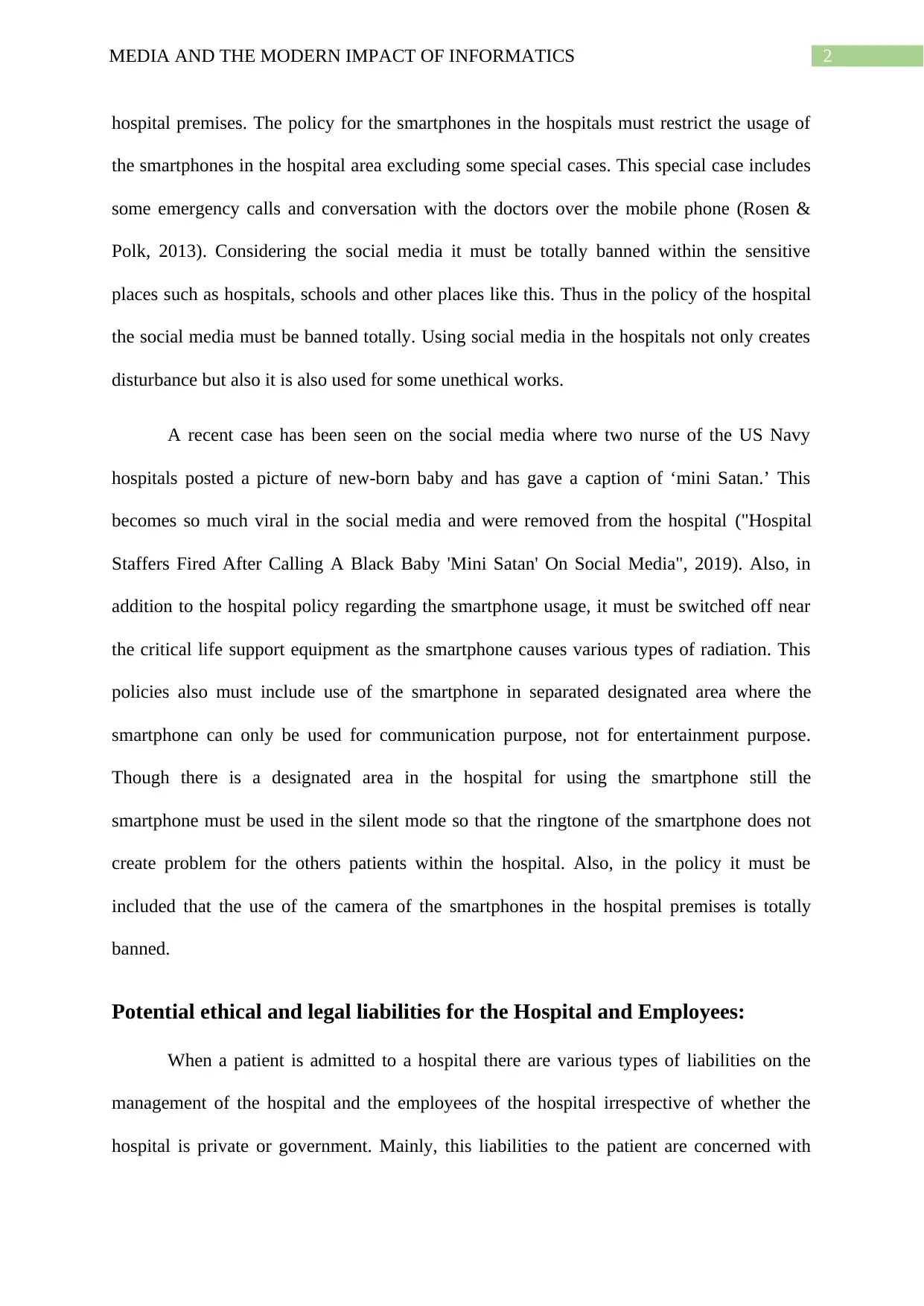
2MEDIA AND THE MODERN IMPACT OF INFORMATICS
hospital premises. The policy for the smartphones in the hospitals must restrict the usage of
the smartphones in the hospital area excluding some special cases. This special case includes
some emergency calls and conversation with the doctors over the mobile phone (Rosen &
Polk, 2013). Considering the social media it must be totally banned within the sensitive
places such as hospitals, schools and other places like this. Thus in the policy of the hospital
the social media must be banned totally. Using social media in the hospitals not only creates
disturbance but also it is also used for some unethical works.
A recent case has been seen on the social media where two nurse of the US Navy
hospitals posted a picture of new-born baby and has gave a caption of ‘mini Satan.’ This
becomes so much viral in the social media and were removed from the hospital ("Hospital
Staffers Fired After Calling A Black Baby 'Mini Satan' On Social Media", 2019). Also, in
addition to the hospital policy regarding the smartphone usage, it must be switched off near
the critical life support equipment as the smartphone causes various types of radiation. This
policies also must include use of the smartphone in separated designated area where the
smartphone can only be used for communication purpose, not for entertainment purpose.
Though there is a designated area in the hospital for using the smartphone still the
smartphone must be used in the silent mode so that the ringtone of the smartphone does not
create problem for the others patients within the hospital. Also, in the policy it must be
included that the use of the camera of the smartphones in the hospital premises is totally
banned.
Potential ethical and legal liabilities for the Hospital and Employees:
When a patient is admitted to a hospital there are various types of liabilities on the
management of the hospital and the employees of the hospital irrespective of whether the
hospital is private or government. Mainly, this liabilities to the patient are concerned with
hospital premises. The policy for the smartphones in the hospitals must restrict the usage of
the smartphones in the hospital area excluding some special cases. This special case includes
some emergency calls and conversation with the doctors over the mobile phone (Rosen &
Polk, 2013). Considering the social media it must be totally banned within the sensitive
places such as hospitals, schools and other places like this. Thus in the policy of the hospital
the social media must be banned totally. Using social media in the hospitals not only creates
disturbance but also it is also used for some unethical works.
A recent case has been seen on the social media where two nurse of the US Navy
hospitals posted a picture of new-born baby and has gave a caption of ‘mini Satan.’ This
becomes so much viral in the social media and were removed from the hospital ("Hospital
Staffers Fired After Calling A Black Baby 'Mini Satan' On Social Media", 2019). Also, in
addition to the hospital policy regarding the smartphone usage, it must be switched off near
the critical life support equipment as the smartphone causes various types of radiation. This
policies also must include use of the smartphone in separated designated area where the
smartphone can only be used for communication purpose, not for entertainment purpose.
Though there is a designated area in the hospital for using the smartphone still the
smartphone must be used in the silent mode so that the ringtone of the smartphone does not
create problem for the others patients within the hospital. Also, in the policy it must be
included that the use of the camera of the smartphones in the hospital premises is totally
banned.
Potential ethical and legal liabilities for the Hospital and Employees:
When a patient is admitted to a hospital there are various types of liabilities on the
management of the hospital and the employees of the hospital irrespective of whether the
hospital is private or government. Mainly, this liabilities to the patient are concerned with
⊘ This is a preview!⊘
Do you want full access?
Subscribe today to unlock all pages.

Trusted by 1+ million students worldwide
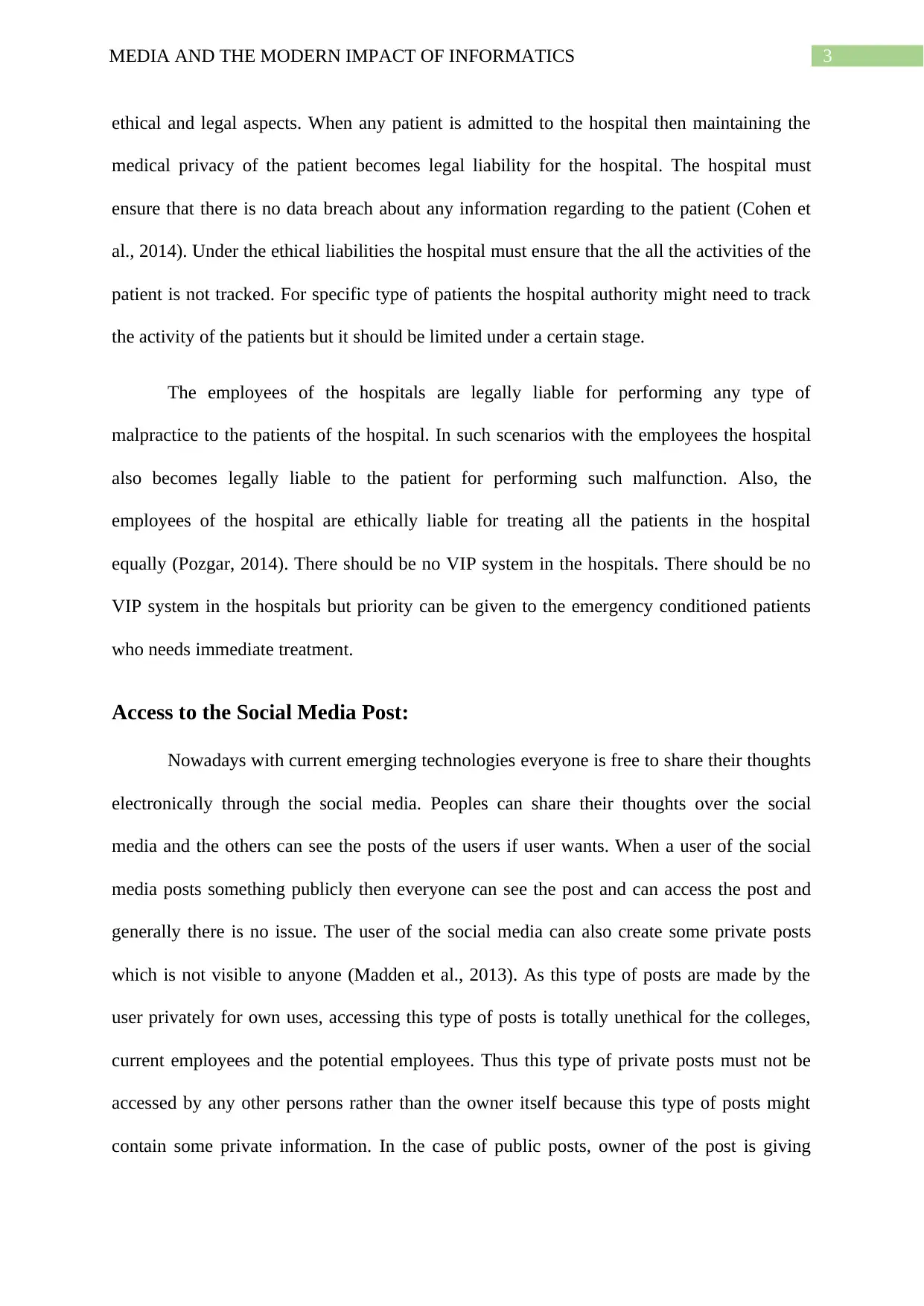
3MEDIA AND THE MODERN IMPACT OF INFORMATICS
ethical and legal aspects. When any patient is admitted to the hospital then maintaining the
medical privacy of the patient becomes legal liability for the hospital. The hospital must
ensure that there is no data breach about any information regarding to the patient (Cohen et
al., 2014). Under the ethical liabilities the hospital must ensure that the all the activities of the
patient is not tracked. For specific type of patients the hospital authority might need to track
the activity of the patients but it should be limited under a certain stage.
The employees of the hospitals are legally liable for performing any type of
malpractice to the patients of the hospital. In such scenarios with the employees the hospital
also becomes legally liable to the patient for performing such malfunction. Also, the
employees of the hospital are ethically liable for treating all the patients in the hospital
equally (Pozgar, 2014). There should be no VIP system in the hospitals. There should be no
VIP system in the hospitals but priority can be given to the emergency conditioned patients
who needs immediate treatment.
Access to the Social Media Post:
Nowadays with current emerging technologies everyone is free to share their thoughts
electronically through the social media. Peoples can share their thoughts over the social
media and the others can see the posts of the users if user wants. When a user of the social
media posts something publicly then everyone can see the post and can access the post and
generally there is no issue. The user of the social media can also create some private posts
which is not visible to anyone (Madden et al., 2013). As this type of posts are made by the
user privately for own uses, accessing this type of posts is totally unethical for the colleges,
current employees and the potential employees. Thus this type of private posts must not be
accessed by any other persons rather than the owner itself because this type of posts might
contain some private information. In the case of public posts, owner of the post is giving
ethical and legal aspects. When any patient is admitted to the hospital then maintaining the
medical privacy of the patient becomes legal liability for the hospital. The hospital must
ensure that there is no data breach about any information regarding to the patient (Cohen et
al., 2014). Under the ethical liabilities the hospital must ensure that the all the activities of the
patient is not tracked. For specific type of patients the hospital authority might need to track
the activity of the patients but it should be limited under a certain stage.
The employees of the hospitals are legally liable for performing any type of
malpractice to the patients of the hospital. In such scenarios with the employees the hospital
also becomes legally liable to the patient for performing such malfunction. Also, the
employees of the hospital are ethically liable for treating all the patients in the hospital
equally (Pozgar, 2014). There should be no VIP system in the hospitals. There should be no
VIP system in the hospitals but priority can be given to the emergency conditioned patients
who needs immediate treatment.
Access to the Social Media Post:
Nowadays with current emerging technologies everyone is free to share their thoughts
electronically through the social media. Peoples can share their thoughts over the social
media and the others can see the posts of the users if user wants. When a user of the social
media posts something publicly then everyone can see the post and can access the post and
generally there is no issue. The user of the social media can also create some private posts
which is not visible to anyone (Madden et al., 2013). As this type of posts are made by the
user privately for own uses, accessing this type of posts is totally unethical for the colleges,
current employees and the potential employees. Thus this type of private posts must not be
accessed by any other persons rather than the owner itself because this type of posts might
contain some private information. In the case of public posts, owner of the post is giving
Paraphrase This Document
Need a fresh take? Get an instant paraphrase of this document with our AI Paraphraser
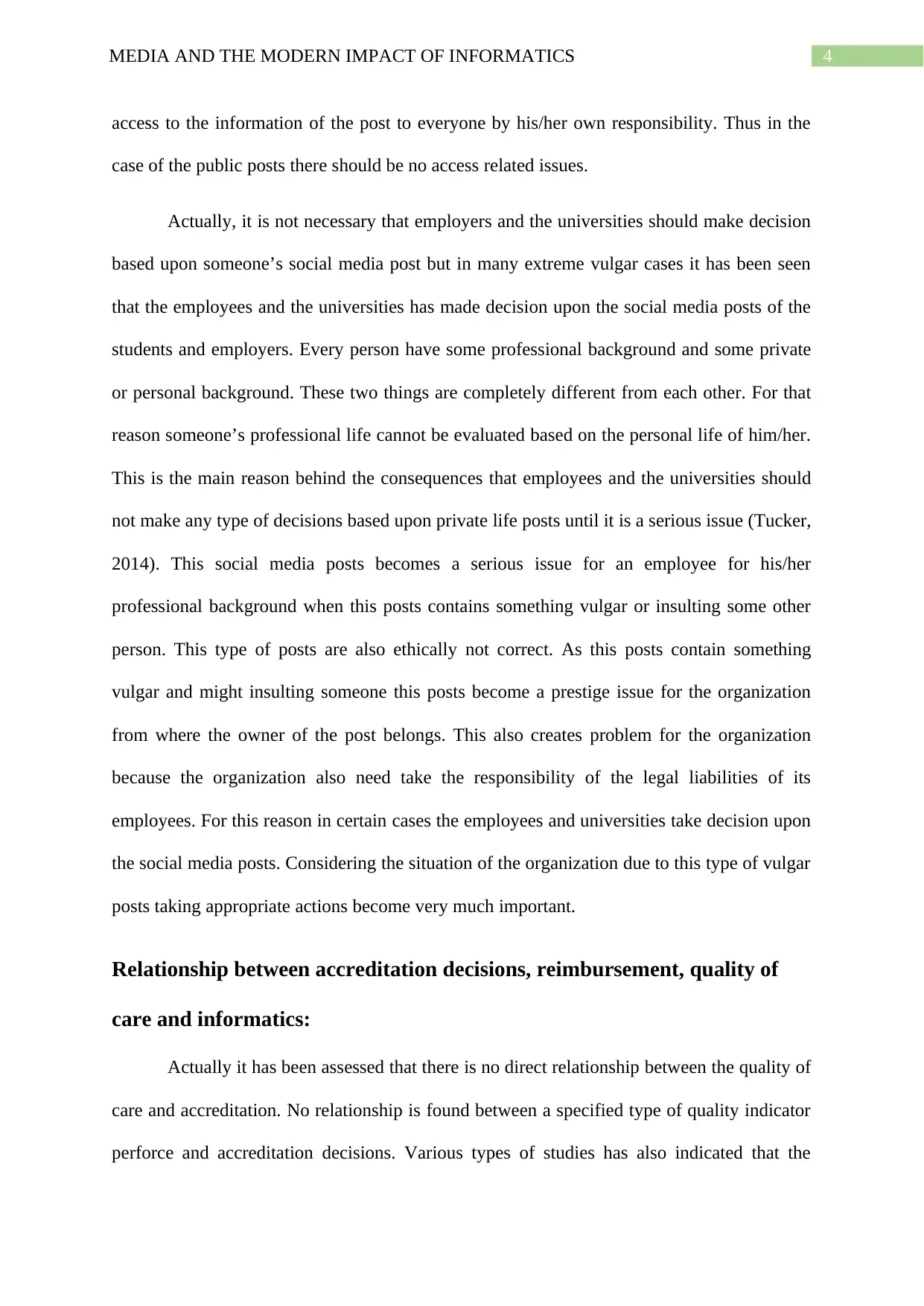
4MEDIA AND THE MODERN IMPACT OF INFORMATICS
access to the information of the post to everyone by his/her own responsibility. Thus in the
case of the public posts there should be no access related issues.
Actually, it is not necessary that employers and the universities should make decision
based upon someone’s social media post but in many extreme vulgar cases it has been seen
that the employees and the universities has made decision upon the social media posts of the
students and employers. Every person have some professional background and some private
or personal background. These two things are completely different from each other. For that
reason someone’s professional life cannot be evaluated based on the personal life of him/her.
This is the main reason behind the consequences that employees and the universities should
not make any type of decisions based upon private life posts until it is a serious issue (Tucker,
2014). This social media posts becomes a serious issue for an employee for his/her
professional background when this posts contains something vulgar or insulting some other
person. This type of posts are also ethically not correct. As this posts contain something
vulgar and might insulting someone this posts become a prestige issue for the organization
from where the owner of the post belongs. This also creates problem for the organization
because the organization also need take the responsibility of the legal liabilities of its
employees. For this reason in certain cases the employees and universities take decision upon
the social media posts. Considering the situation of the organization due to this type of vulgar
posts taking appropriate actions become very much important.
Relationship between accreditation decisions, reimbursement, quality of
care and informatics:
Actually it has been assessed that there is no direct relationship between the quality of
care and accreditation. No relationship is found between a specified type of quality indicator
perforce and accreditation decisions. Various types of studies has also indicated that the
access to the information of the post to everyone by his/her own responsibility. Thus in the
case of the public posts there should be no access related issues.
Actually, it is not necessary that employers and the universities should make decision
based upon someone’s social media post but in many extreme vulgar cases it has been seen
that the employees and the universities has made decision upon the social media posts of the
students and employers. Every person have some professional background and some private
or personal background. These two things are completely different from each other. For that
reason someone’s professional life cannot be evaluated based on the personal life of him/her.
This is the main reason behind the consequences that employees and the universities should
not make any type of decisions based upon private life posts until it is a serious issue (Tucker,
2014). This social media posts becomes a serious issue for an employee for his/her
professional background when this posts contains something vulgar or insulting some other
person. This type of posts are also ethically not correct. As this posts contain something
vulgar and might insulting someone this posts become a prestige issue for the organization
from where the owner of the post belongs. This also creates problem for the organization
because the organization also need take the responsibility of the legal liabilities of its
employees. For this reason in certain cases the employees and universities take decision upon
the social media posts. Considering the situation of the organization due to this type of vulgar
posts taking appropriate actions become very much important.
Relationship between accreditation decisions, reimbursement, quality of
care and informatics:
Actually it has been assessed that there is no direct relationship between the quality of
care and accreditation. No relationship is found between a specified type of quality indicator
perforce and accreditation decisions. Various types of studies has also indicated that the
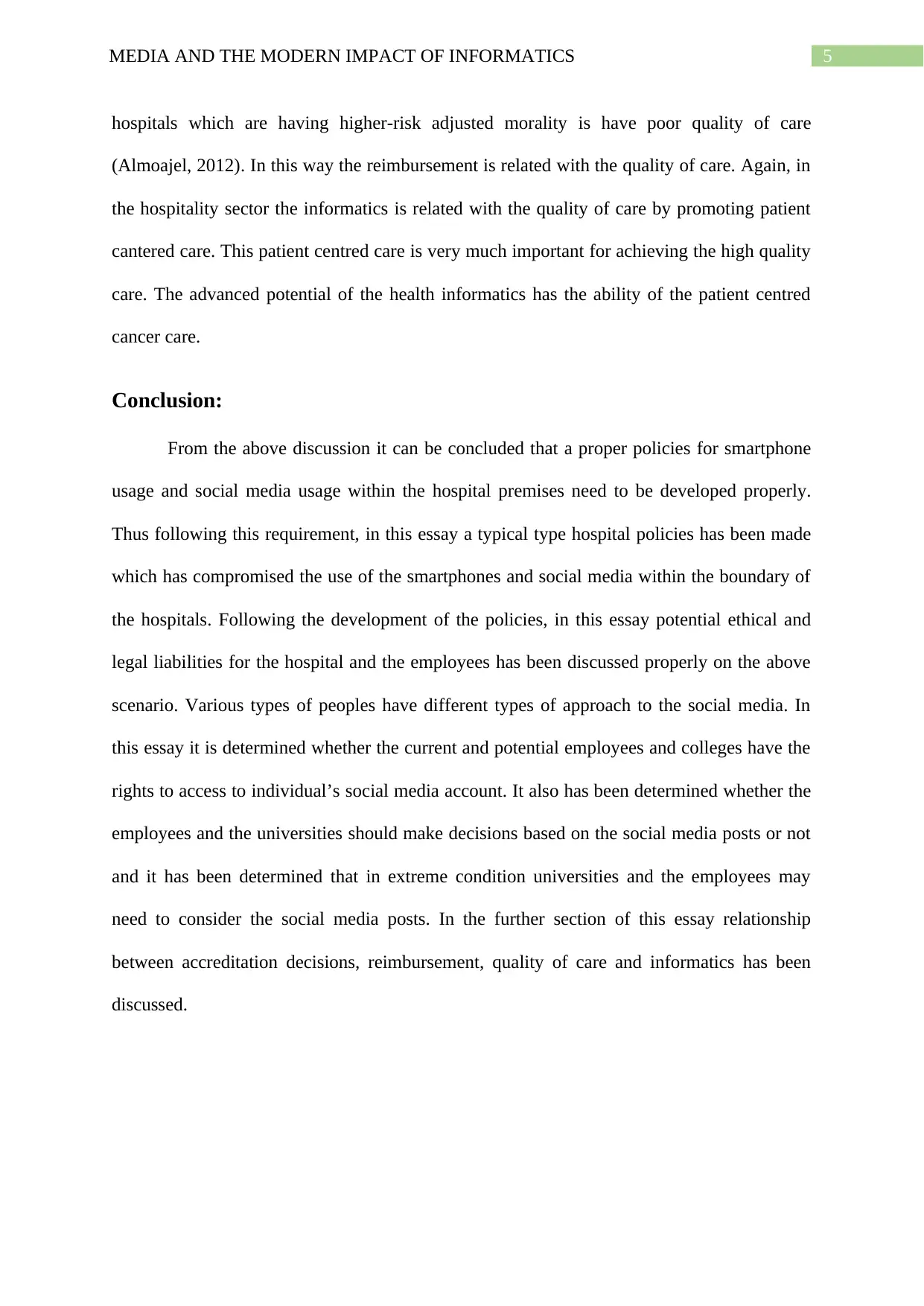
5MEDIA AND THE MODERN IMPACT OF INFORMATICS
hospitals which are having higher-risk adjusted morality is have poor quality of care
(Almoajel, 2012). In this way the reimbursement is related with the quality of care. Again, in
the hospitality sector the informatics is related with the quality of care by promoting patient
cantered care. This patient centred care is very much important for achieving the high quality
care. The advanced potential of the health informatics has the ability of the patient centred
cancer care.
Conclusion:
From the above discussion it can be concluded that a proper policies for smartphone
usage and social media usage within the hospital premises need to be developed properly.
Thus following this requirement, in this essay a typical type hospital policies has been made
which has compromised the use of the smartphones and social media within the boundary of
the hospitals. Following the development of the policies, in this essay potential ethical and
legal liabilities for the hospital and the employees has been discussed properly on the above
scenario. Various types of peoples have different types of approach to the social media. In
this essay it is determined whether the current and potential employees and colleges have the
rights to access to individual’s social media account. It also has been determined whether the
employees and the universities should make decisions based on the social media posts or not
and it has been determined that in extreme condition universities and the employees may
need to consider the social media posts. In the further section of this essay relationship
between accreditation decisions, reimbursement, quality of care and informatics has been
discussed.
hospitals which are having higher-risk adjusted morality is have poor quality of care
(Almoajel, 2012). In this way the reimbursement is related with the quality of care. Again, in
the hospitality sector the informatics is related with the quality of care by promoting patient
cantered care. This patient centred care is very much important for achieving the high quality
care. The advanced potential of the health informatics has the ability of the patient centred
cancer care.
Conclusion:
From the above discussion it can be concluded that a proper policies for smartphone
usage and social media usage within the hospital premises need to be developed properly.
Thus following this requirement, in this essay a typical type hospital policies has been made
which has compromised the use of the smartphones and social media within the boundary of
the hospitals. Following the development of the policies, in this essay potential ethical and
legal liabilities for the hospital and the employees has been discussed properly on the above
scenario. Various types of peoples have different types of approach to the social media. In
this essay it is determined whether the current and potential employees and colleges have the
rights to access to individual’s social media account. It also has been determined whether the
employees and the universities should make decisions based on the social media posts or not
and it has been determined that in extreme condition universities and the employees may
need to consider the social media posts. In the further section of this essay relationship
between accreditation decisions, reimbursement, quality of care and informatics has been
discussed.
⊘ This is a preview!⊘
Do you want full access?
Subscribe today to unlock all pages.

Trusted by 1+ million students worldwide
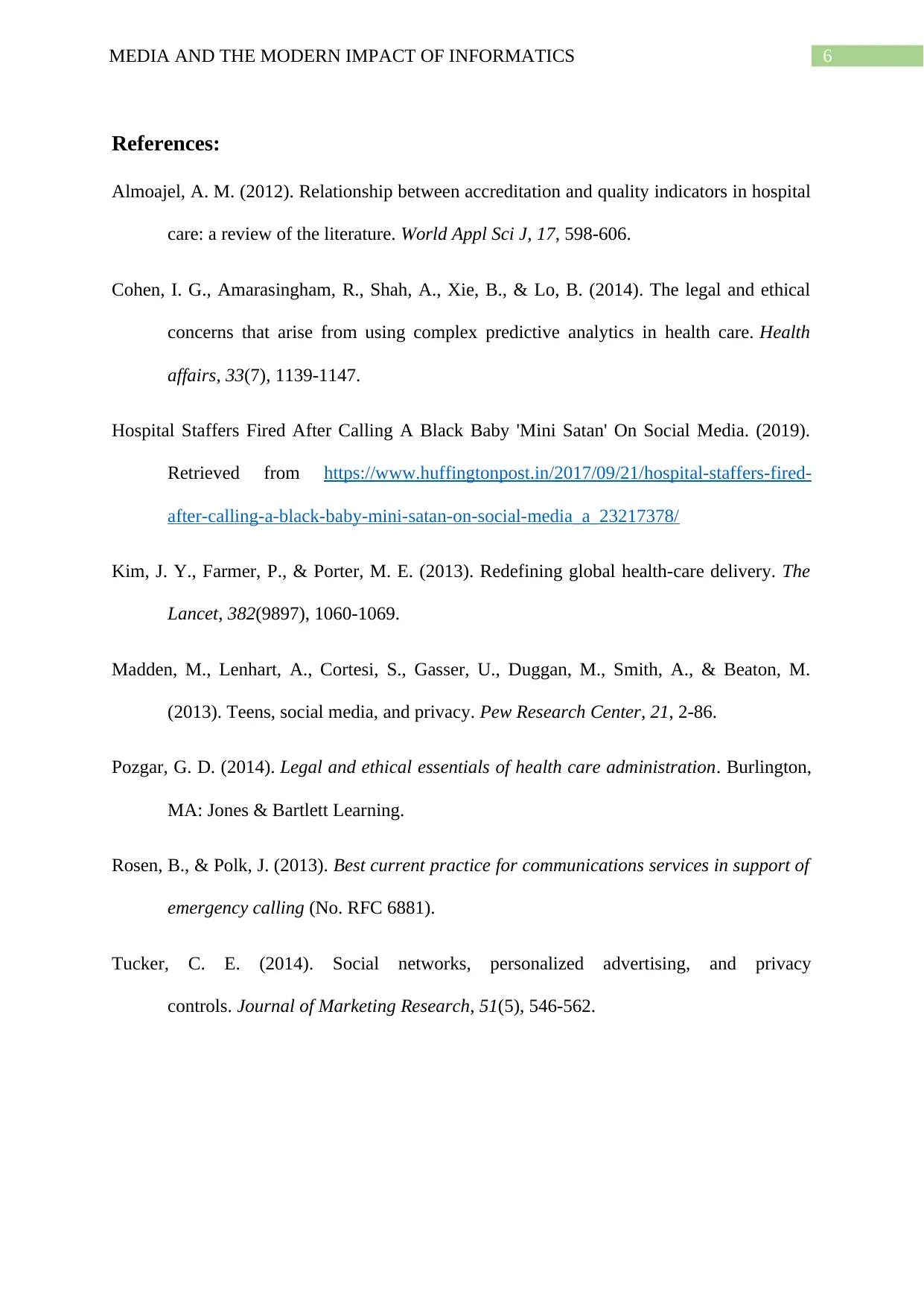
6MEDIA AND THE MODERN IMPACT OF INFORMATICS
References:
Almoajel, A. M. (2012). Relationship between accreditation and quality indicators in hospital
care: a review of the literature. World Appl Sci J, 17, 598-606.
Cohen, I. G., Amarasingham, R., Shah, A., Xie, B., & Lo, B. (2014). The legal and ethical
concerns that arise from using complex predictive analytics in health care. Health
affairs, 33(7), 1139-1147.
Hospital Staffers Fired After Calling A Black Baby 'Mini Satan' On Social Media. (2019).
Retrieved from https://www.huffingtonpost.in/2017/09/21/hospital-staffers-fired-
after-calling-a-black-baby-mini-satan-on-social-media_a_23217378/
Kim, J. Y., Farmer, P., & Porter, M. E. (2013). Redefining global health-care delivery. The
Lancet, 382(9897), 1060-1069.
Madden, M., Lenhart, A., Cortesi, S., Gasser, U., Duggan, M., Smith, A., & Beaton, M.
(2013). Teens, social media, and privacy. Pew Research Center, 21, 2-86.
Pozgar, G. D. (2014). Legal and ethical essentials of health care administration. Burlington,
MA: Jones & Bartlett Learning.
Rosen, B., & Polk, J. (2013). Best current practice for communications services in support of
emergency calling (No. RFC 6881).
Tucker, C. E. (2014). Social networks, personalized advertising, and privacy
controls. Journal of Marketing Research, 51(5), 546-562.
References:
Almoajel, A. M. (2012). Relationship between accreditation and quality indicators in hospital
care: a review of the literature. World Appl Sci J, 17, 598-606.
Cohen, I. G., Amarasingham, R., Shah, A., Xie, B., & Lo, B. (2014). The legal and ethical
concerns that arise from using complex predictive analytics in health care. Health
affairs, 33(7), 1139-1147.
Hospital Staffers Fired After Calling A Black Baby 'Mini Satan' On Social Media. (2019).
Retrieved from https://www.huffingtonpost.in/2017/09/21/hospital-staffers-fired-
after-calling-a-black-baby-mini-satan-on-social-media_a_23217378/
Kim, J. Y., Farmer, P., & Porter, M. E. (2013). Redefining global health-care delivery. The
Lancet, 382(9897), 1060-1069.
Madden, M., Lenhart, A., Cortesi, S., Gasser, U., Duggan, M., Smith, A., & Beaton, M.
(2013). Teens, social media, and privacy. Pew Research Center, 21, 2-86.
Pozgar, G. D. (2014). Legal and ethical essentials of health care administration. Burlington,
MA: Jones & Bartlett Learning.
Rosen, B., & Polk, J. (2013). Best current practice for communications services in support of
emergency calling (No. RFC 6881).
Tucker, C. E. (2014). Social networks, personalized advertising, and privacy
controls. Journal of Marketing Research, 51(5), 546-562.
1 out of 7
Related Documents
Your All-in-One AI-Powered Toolkit for Academic Success.
+13062052269
info@desklib.com
Available 24*7 on WhatsApp / Email
![[object Object]](/_next/static/media/star-bottom.7253800d.svg)
Unlock your academic potential
Copyright © 2020–2026 A2Z Services. All Rights Reserved. Developed and managed by ZUCOL.





